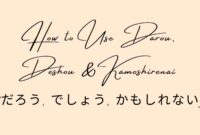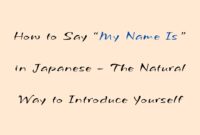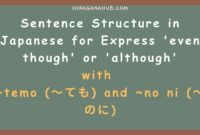Time for Activities (Subject + wa + Time + に + Verb (ka))

If you’re learning Japanese grammar, the particle “ni” is one of the essential
elements. This article will explain its usage in indicating specific times for
various activities. This discussion is ideal for those attending free online
Japanese classes or paid courses.
What Is the Particle “に” (Ni)?
The particle “に” has multiple functions in Japanese, one of which is to
indicate a specific time. This can include clear references to hours, minutes,
seconds, dates, or months. Understanding its function will help you construct
more accurate sentences.
Examples:
- 私はごぜん八時に起きます。 (Watashi wa gozen hachiji ni okimasu.)
- I wake up at 8 a.m.
-
今月11日に出発します。
(Kyou juuichinichi ni shuppatsu shimasu.) - I will leave on the 11th of this month.
When to Use the Particle “Ni” (に)
“に” is used to indicate specific and well-defined times. Here are some
examples of time expressions that require this particle:
Hours and Minutes
- 午後七時半にお湯を飲みます。 (Gogo shichiji han ni oyu o nomimasu.)
- I drink tea at 7:30 p.m.
Dates
-
私たちは二月七日にパーティーに行きます。
(Watashitachi wa nigatsu nanoka ni paatii ni ikimasu.) - We are going to a party on February 7th.
Specific Months or Years
-
私は2025年に日本に移住します。
(Watashi wa nisen nijuu go nen ni Nihon ni ijyuu shimasu.) - I will move to Japan in 2025.
When Not to Use the Particle “Ni”
Certain time expressions do not use “に” because they are general or
undefined. Examples include:
- Kyou (今日) — Today
- Ima (今) — Now
- Hiru (昼) — Noon
- Yoru (晩) — Evening
- Kino (昨日) — Yesterday
- Ototoi (一昨日) — The day before yesterday
- Asita (明日) — Tomorrow
- Raisyu (来週) — Next week
- Mai asa (毎朝) — Every morning
- Mai bang (毎晩) — Every evening
- Mai nichi (毎日) — Every day
For more clarity, refer to a vocabulary list for time-related terms.
Examples:
- 今日、私は学校に行きます。 (Kyou, watashi wa gakkou ni ikimasu.)
- Today, I am going to school.
- 毎朝、私はコーヒーを飲みます。 (Mai asa, watashi wa koohii o nomimasu.)
- Every morning, I drink coffee.
When “に” Is Optional
Some time expressions are flexible, meaning “Ni” can be used or omitted:
- Yōbi (曜日) — Days of the week
- Asa (朝) — Morning
- Hiru (昼) — Noon
- Ban (晩) — Evening
Examples:
- 土曜日にサッカーをします。 (Doyoubi ni sakkā o shimasu.)
- I play soccer on Saturday.
- 土曜日、サッカーをします。 (Doyoubi, sakkā o shimasu.)
- On Saturday, I play soccer.
Tips for Using the Particle “に”
-
Pay attention to specific times. Use this particle when the time is clear,
such as an hour or date. -
Understand the context. Not all time expressions require “Ni”; adapt to the
type of time expression used. -
Practice making sentences. With practice, you will naturally know when to
use “に.”
Further Learning in Japanese
To deepen your understanding of Japanese grammar, many platforms offer online
classes. You can learn to construct sentences, understand everyday
expressions, and translate Japanese more easily. Flexible learning options
allow you to adjust your schedule to your needs.
Understanding the particle “ni” is essential for building a solid foundation
in Japanese grammar. With practice, you’ll be able to construct more precise
and effective sentences. Happy learning!


